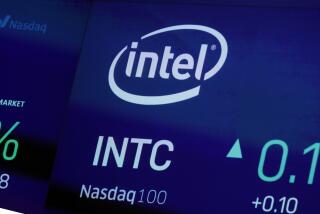Intel, Digital Brace for a Risky Battle
- Share via
Just days after Digital Equipment Corp. blindsided Intel Corp. with a sweeping patent-infringement suit, both companies braced for a legal fight that could take years, cost millions of dollars and dramatically affect the landscape of the high-tech industry.
The pieces of technology at the heart of the suit are slivers of silicon so tiny they can be seen only through a microscope. But the stakes are huge.
If Digital loses, it will have spent precious resources fighting a courtroom battle at a time when the Maynard, Mass.-based computer and chip maker is trying to rebound from several years of slowing sales and steep losses.
But if Digital prevails, Santa Clara, Calif.-based Intel could be forced to pay billions of dollars in damages, cede key ground in the microprocessor industry it now dominates, and face having to redesign its chips or pay licensing fees to Digital.
In a suit filed in federal court in Massachusetts on Monday, Digital accused Intel of building its best-selling Pentium processors with technology the company stole from Digital.
The suit stunned the industry and marked the first major challenge in years for Intel, which supplies the chips that run 85% of the world’s computers, including some manufactured by Digital.
Intel posted a profit of $5.16 billion on sales of $20.8 billion last year.
Experts said the fight could soon cost the companies millions of dollars a month in legal bills, and that predictable strategies are likely to unfold.
Intel is likely to countersue, stall and possibly try to settle to avoid putting the company’s fate in the control of a handful of jurors, said Ken Adamo, a Dallas attorney who helped Texas Instruments win billions of dollars in intellectual-property suits over the last decade.
Digital, he said, will almost certainly demand a jury trial, push hard for an early trial date and play up its underdog role--even though the company itself is an industry giant.
“It’s a gutsy move for Digital, but it’s a great case to tell the jury,” Adamo said. “I’m the canary and they’re the gorilla, and they stole from us.”
Semiconductor experts said there are parallels between Intel’s Pentium chips and Digital’s Alpha line of high-performance microprocessors.
“There are at least a few places where there seem to be significant similarities,” said Linley Gwennap, editor of the Microprocessor Report in Sunnyvale. Still, he said, “there’s no smoking gun.”
Intel officials said Wednesday the company has not violated any patents, and will fight the suit. In a separate matter, Intel was hit with a similar suit Tuesday by its smaller PC chip rival, Cyrix Corp. But experts said the Digital suit is a far greater threat.
Intel shares fell as low as $146.125 on Wednesday before rebounding to close at $152.75, up 37.5 cents, on Nasdaq. DEC shares lost 75 cents to close at $34.625 after trading as high as $36.25 on the New York Stock Exchange.
The suit centers on 10 patents Digital obtained between 1988 and 1996, involving technologies that enhance the speed and performance of microprocessors, the “brains” of computers.
Digital executives said the suit was the culmination of an extensive investigation launched 18 months ago after Intel introduced its Pentium Pro microprocessor. That chip delivered a significant performance boost over earlier versions and, for the first time, put Intel in a position to compete with Digital’s high-end Alpha chip.
Bill Strecker, chief operating officer of technology at Digital, said the company’s suspicions were raised by the dramatic improvement in the Pentium Pro, and even more so by comments made by Intel executives in a story that appeared in the Wall Street Journal in August.
Describing plans to boost research efforts at Intel, executives made remarks that implied Intel had previously borrowed technology from other sources. “There’s nothing left to copy,” one executive was quoted as saying.
Those remarks could be a critical piece of Digital’s case, in addition to an alleged meeting between the two companies in the early 1990s, when Digital executives say they presented Intel with an opportunity to license the Alpha chip technology.
Intel declined, but Digital executives claim the company copied the technology anyway. Intel denies the allegations.
The stakes of the suit may encourage Intel to push for a settlement, Adamo said. After all, a trial would put Intel in the awkward position of placing the fate of its business in the hands of a jury that may understand very little about microprocessor technology.
“You’ve got to assume these folks wouldn’t know an electron if it invited them out for coffee,” Adamo said. “The exposure to Intel on this is huge, and that’s one big risk to swallow.”






